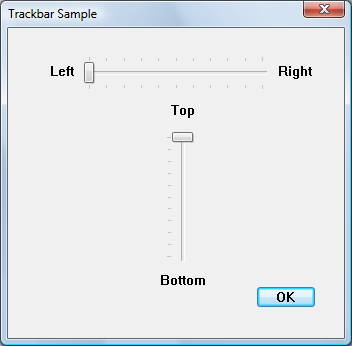Note
Access to this page requires authorization. You can try signing in or changing directories.
Access to this page requires authorization. You can try changing directories.
By setting other controls as buddy windows for a trackbar, you can automatically position those controls at the ends of the trackbar as labels.
The following illustration shows a horizontal and a vertical trackbar, both with static controls as buddy windows.

What you need to know
Technologies
Prerequisites
- C/C++
- Windows User Interface Programming
Instructions
Use Buddy Windows
The following code example creates the buddy windows shown in the illustration.
void LabelTrackbarsWithBuddies(HWND hDlg)
{
HWND hwndTrackbar;
HWND hwndBuddy;
const int staticWidth = 50;
const int staticHeight = 20;
//======================================================
// For horizontal Trackbar.
hwndTrackbar = GetDlgItem(hDlg, IDC_SLIDER1);
hwndBuddy = CreateWindowEx(0, L"STATIC", L"Left", SS_RIGHT | WS_CHILD | WS_VISIBLE,
0, 0, staticWidth, staticHeight, hDlg, NULL, g_hInst, NULL);
SendMessage(hwndTrackbar, TBM_SETBUDDY, (WPARAM)TRUE, (LPARAM)hwndBuddy);
//-------------------------------------------------
hwndBuddy = CreateWindowEx(0, L"STATIC", L"Right", SS_LEFT | WS_CHILD | WS_VISIBLE,
0, 0, staticWidth, staticHeight, hDlg, NULL, g_hInst, NULL);
SendMessage(hwndTrackbar, TBM_SETBUDDY, (WPARAM)FALSE, (LPARAM)hwndBuddy);
//======================================================
// For vertical Trackbar.
hwndTrackbar = GetDlgItem(hDlg, IDC_SLIDER2);
hwndBuddy = CreateWindowEx(0, L"STATIC", L"Top", SS_CENTER | WS_CHILD | WS_VISIBLE,
0, 0, staticWidth, staticHeight, hDlg, NULL, g_hInst, NULL);
SendMessage(hwndTrackbar, TBM_SETBUDDY, (WPARAM)TRUE, (LPARAM)hwndBuddy);
//-------------------------------------------------
hwndBuddy = CreateWindowEx(0, L"STATIC", L"Bottom", SS_CENTER | WS_CHILD | WS_VISIBLE,
0, 0, staticWidth, staticHeight, hDlg, NULL, g_hInst, NULL);
SendMessage(hwndTrackbar, TBM_SETBUDDY, (WPARAM)FALSE, (LPARAM)hwndBuddy);
}
Remarks
IDC_SLIDER1 and IDC_SLIDER2 are trackbars created in the resource editor.
Related topics